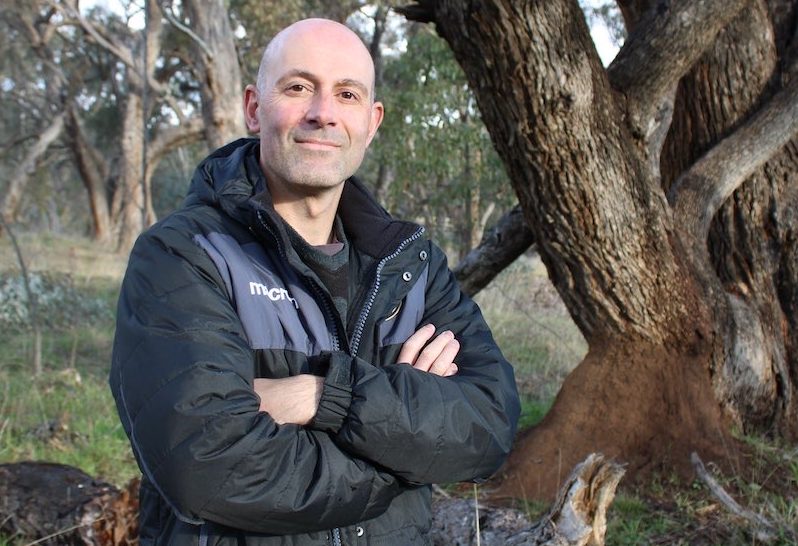
HOW do you find someone who doesn’t exist?
It’s the question at the centre of Peter Papathanasiou’s new crime thriller “The Invisible” – a book inspired by a man he encountered in the far-flung corners of Northern Greece who lived without a scrap of official paperwork proving his existence.
No driver’s licence, no credit card, no address, no birth record, no social media, not even a library card. In our modern world, it seems almost impossible.
When Papathanasiou came across this strange figure, who the locals described as “invisible”, he knew he had the idea for his next book.
“This guy was charismatic, he spoke four languages, and yet nobody really knew what his surname was,” says Peter.
“He claimed he had four different kids to four different women and claimed he was born in four different places and you didn’t know what was true and what wasn’t and that was part of his charm.
“For all intents and purposes, this person doesn’t exist, but he knew all the right people, he could grease the right palms to get what he wanted and I thought if you’re going to tell a story about a character like that then they’ve gotta go missing.”
In “The Invisible” Det-Sgt George Manolis is forced to hunt down a missing person who, like the curious man Peter had encountered, is all but untraceable.
It’s the sequel to last year’s “The Stoning”, a book that saw Papathanasiou labelled a “brilliant new name in Australian crime” and a plot described by renowned author Chris Hammer as “outback noir with the noir dialled right up”.
But while his first novel peeled back Australia’s cultural layers to reveal a darker side of the country, in “The Invisible”, Papathanasiou’s central detective travels home to the sparse and untamed northern regions of Greece.
It’s no coincidence that it also happens to be Peter’s own birthplace.
“It’s very different from the Greece that most people know. It’s a place that people fly over when they go to Athens or the Greek Islands or other parts of Europe,” he says.
“There’s power stations, electricity production, coal mining. Life in that part of the world is slow and contemplative, meditative. It’s essentially outback Greece.”
In many ways, Peter says “The Invisible” was his chance to bring the place he was born to an Australian audience who wouldn’t otherwise encounter it.
“The untamed frontier setting for ‘The Invisible’ is where I was born, where my family still lives, where I regularly visit, and which is generally not seen by outsiders,” he says.
“The tiny fishing community of Psarades formed the basis for the mythical village of Glikonero. With decorated churches and eerie forests and reclusive locals, I thought this was a really compelling setting in which to set a crime novel, and one that I was uniquely positioned to write.”
It’s a far cry from his home tucked away in Hackett where he lives today with his wife and three children.
Both crime and fiction are long-held passions for the 48-year-old, having studied criminal law at the ANU and creative writing at City University in London.
“I think the interesting thing about crime is this idea of a puzzle,” he says.
“You can say a lot about society through the prism of a crime because things get uncovered and questions get asked about communities and families.
“As a crime writer you’ve got to create that puzzle, which I do find challenging, but fascinating.”
It’s no surprise Peter is already in talks about possible screen adaptations for “The Stoning” and “The Invisible”. A third book in his noir-laden universe is already in the works that will see his fractured detective return to Australia.
While outback noir in Australia has more than hit its stride, it’s Peter’s hope that the “Greek Noir” in his new book may encourage others to explore the unique setting.
“There aren’t many books like ‘The Invisible’ in the market, which makes it one that I’m very proud to share with readers,” he says.
“In five years’ time it might be the only thing set in the area or, who knows, it might kick the door down.”
“The Invisible” by Peter Papathanasiou, Hachette Australia, available from September.
Who can be trusted?
In a world of spin and confusion, there’s never been a more important time to support independent journalism in Canberra.
If you trust our work online and want to enforce the power of independent voices, I invite you to make a small contribution.
Every dollar of support is invested back into our journalism to help keep citynews.com.au strong and free.
Thank you,
Ian Meikle, editor




Leave a Reply